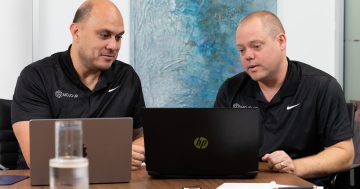
OPC staff undergo specialised AI training. Photo: Michelle Kroll.
Like the internet and social media, AI may have once been dismissed as a fad, but if you’re thinking of joining a growing number of people embracing the technology in some form to enhance their businesses, local experts advise proceeding with caution.
OPC CEO Clinton Henderson, who uses Microsoft’s Copilot to help navigate his busy calendar, says it’s fair for businesses to feel concerned about being left behind.
“There are massive productivity gains from AI. It allows me to get up to speed in moments for virtual meetings – especially regular meetings with clients,” he says.
“Ahead of a meeting, I ask Copilot to go back and review and summarise all meeting minutes and communications from the past with that client and create a summary of previous talking points, action items and commitments, so you’re up to date before joining. That’s an invaluable time-saving tool.
“It’s not about taking people’s jobs; it’s about improving efficiencies and ensuring people can focus on what they’re there to do instead of wasting their valuable time on mundane tasks.”
Clinton advises going in with your eyes wide open to the possibilities, but also the potential pitfalls. That’s why when granting AI access to company data, you may need controls to ensure it can observe your existing permissions.
“An employee might be responding to a tender and want Copilot to find a specific paragraph in a specific document, and it’s very good at that. But with that comes the risk in that they may unwittingly search for things they shouldn’t have access to,” he says.
“That’s a real risk if you’re not managing your data governance properly.”
OPC Operations Manager Peter Shobbrook believes the rewards are worth the effort – but there’s a caveat.
He points out that if you’re going to the trouble and expense of introducing AI into your workplace, you might as well learn how to get the most out of it. It starts with awareness of the technology’s limitations and maintaining appropriate oversight.
“As I’m sure many people have experienced with ChatGPT and similar AI, it can be very confidently wrong when you ask it a question. Often, the answers look legitimate, but if you don’t know the sources, it’s a bit of a gamble,” he says.
“I’ve seen some amusing emails fly past from someone with a lack of knowledge on a topic, and it’s obviously the work of AI. I’m sure we’ll see more of that as the technology becomes more prevalent, so it’s important to do your own research.
“I think we have to be mindful of slipping into a sense of false security and relying on it too heavily. The technology is not infallible, and I think it is best seen as an enhancement tool, not a replacement for diligence.”
When harnessing AI’s power, don’t underestimate the value of a good prompt. If it doesn’t come naturally, Peter advises investing time into up-skilling.
“Finding the right terminology to communicate to AI what you want in a way that the AI will understand has become a niche skill,” he says.
“At OPC, we send staff in for prompt-writing training, which they can then teach our clients.”
Peter says one of the most common prompt writing mistakes is going “too broad”. Helpful instructions can get as granular as the language tone you want and even your reasons for wanting certain information.
“For example, don’t ask your AI to create an itinerary for a three-day holiday in Tasmania. Tell it you want a three-day holiday from ‘this date to this date’ for a family with three kids aged between five and 10, and that you’re a keen hiker and a foodie, and that you’d prefer to fly direct with one of ‘these carriers’, and all your hotels should have a minimum 4.7-star Google rating, and you want to get home no later than 6 pm on the last day,” he says.
It will be a while before a lack of AI savvy could materially disadvantage a business, but Peter reckons the day will come when it’s a staple.
For businesses wanting to get ahead of that curve, OPC can help prepare you, starting with a readiness assessment including data governance and training on best practices.
“AI is a potentially powerful tool, but you really don’t want to misconfigure it when getting set up,” he says. “After that, the idea would be to make you the expert.”
For more information, contact OPC.
Original Article published by Dione David on Riotact.









